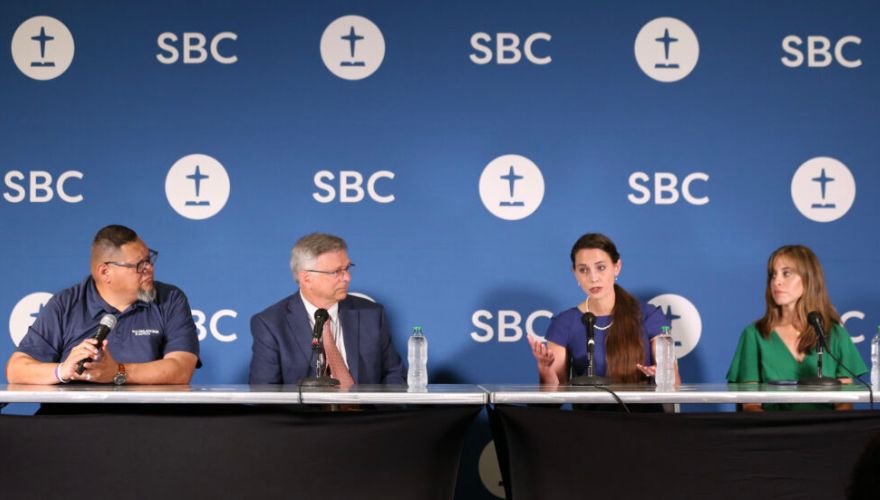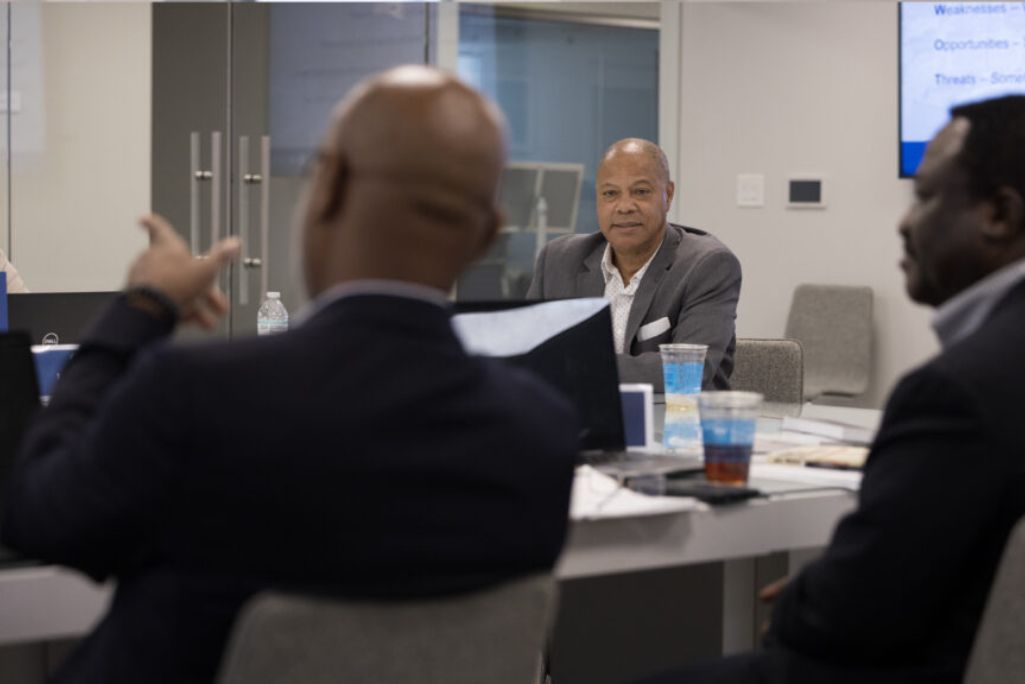
Abuse Reform Implementation Task Force members and consultants (left to right) Mike Keahbone, Marshall Blalock, Rachael Denhollander and Heather Evans answer questions from reporters immediately following their report to messengers June 14 at the 2023 SBC Annual Meeting in New Orleans.
NEW ORLEANS (BP) – One handwritten note stood out when elementary school children at First Baptist Church in Charleston, S.C., made Valentine’s Day cards for Pastor Marshall Blalock.
Virtually all the cards thanked him for being their pastor, but one from a little girl added, “I love our church.” It made Blalock think.
“The first thing that came to my mind is: How many little girls across our country will never be able to write that card to their pastor because their church is not safe?” said Blalock, chairman of the SBC’s Abuse Reform Implementation Task Force (ARITF). “I long for the day when every little girl and every little boy can write a card to their pastor saying, ‘I love our church,’ because they know it’s a safe place.”
The Convention’s vote June 14 in New Orleans to affirm the task force and extend its work for another year was a good step toward that goal, task force leaders said. But there is still much work to be accomplished.
“This is an historic day in many ways,” Blalock said at a press conference following the vote. “For many years, it was said Southern Baptists couldn’t produce a database [of sexual abusers], we couldn’t do what Southern Baptists have done today.”
Blalock and ARITF vice chairman Mike Keahbone, pastor of First Baptist Church in Lawton, Okla., talked with reporters alongside two task force advisors: attorney Rachael Denhollander and licensed clinical social worker Heather Evans.
The task force was appointed last August by SBC President Bart Barber to help implement abuse reform measures adopted by messengers to the 2022 SBC Annual Meeting in Anaheim, Calif. The ARITF’s mandate included establishing a MinistryCheck website to list individuals “credibly accused” of committing abuse. The one-year extension will help Southern Baptists see the website to completion.
The past year has been a difficult journey, Keahbone said, with the task force drawing “friendly fire from every direction” within the SBC. But patience with the process paid off.
“It’s easy to play armchair ARITF when you’re not in the game,” Keahbone said, “when you’re not experiencing what we are experiencing.” It’s more difficult “to stay with it” and keep sexual abuse among Southern Baptists from becoming a “barrier to sharing the Gospel.”
Barber’s reelection as Convention president underscored Southern Baptists’ commitment to reforming their handling of sexual abuse, Blalock said.
The presidential election between Barber and Georgia pastor Mike Stone “was in some ways a referendum on what [Barber] has stood for in the past year,” Blalock said. “One of those major things he has stood for is sex abuse reform and implementation, so we felt like the reelection of Dr. Barber … said we want to continue as Baptists to keep going forward on this issue. We believe his reelection creates a lot of momentum.”
Now the question is whether the task force can utilize its momentum to enact further reforms. Blalock said yes, but it won’t be easy.
At the Baptist 21 lunch June 13 in New Orleans, task force member Jarrett Stephens said the hotline established last year to report abuse among Southern Baptists has received 600 calls, with 300 cases still open. Denhollander said some processes for dealing with those cases have been established while others remain under development.
“There is a trauma-informed intake process where survivor confidentiality is tightly maintained within the team that is taking those calls,” Denhollander said. The intake team gathers all information needed to address two issues: “Is this person credibly accused, and should they be going on the database?” and “Is this church in friendly cooperation?”
Standards for deeming a person “credibly accused” and including them in the abuser registry are being finalized, she said. “This is not creating … some kind of free-for-all. But rather, there are very defined legal standards. There are very defined ethical codes.”
One key to moving forward is convincing churches to participate in the convention’s fight against abuse, Evans said. Making churches a safe place includes “the accountability of abusers,” “exposing the truth” and “support of survivors.”
“There has to be a commitment from the higher-up level and a commitment from the local level,” Evans said.
Associational mission strategists in local Baptist associations must play a key role in communicating with churches, Blalock said. Otherwise, teaching 47,000 churches best practices will be impossible.
By next year’s SBC annual meeting in Indianapolis, Blalock hopes “to see the database fully functioning” with “credibly accused folks’ names on there so that churches are safer next year than they are today.”
“I hope to see the permanent home for sex abuse reform ready to go next June,” he said. “I hope to see permanent funding for this work.”
Keahbone likewise wants to see fruit from the task force’s labor.
“I want to see abusers brought to justice,” he said. “I want to see our churches safer.”
(EDITOR’S NOTE – David Roach is a writer in Mobile, Ala.)


